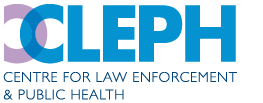About CLEPH
The Centre for Law Enforcement and Public Health Limited (CLEPH) is a not-for-profit company registered in Australia. It was established by a group of interested and expert individuals for the purpose of pursuing projects and advancing knowledge in the joint fields of policing and other law enforcement and the many aspects of public health.
CLEPH is building a focus on the understanding of the nature of this relationship, as a partnership between the public health, and law enforcement worlds. Recognising that the social and structural determinants of health operate at every level, the focus of CLEPH’s vision ranges from the very local to the global. In collaboration with others around the world, CLEPH is building capacity, interest and activities across the whole range of investigation and influence: research, teaching, advocacy, networking (including peer support and education), and engagement with other sectors/disciplines.
The hallmark of CLEPH’s program is partnership with law enforcement, and its emphasis is on the translation of research and knowledge into action and practice.

Themes for CLEPH’s work
CLEPH has prioritised four main themes to guide its work:
- Police leadership in public health, and leadership in public health policing
- Principles of successful local partnerships in addressing complex health and social issues
- Law enforcement and HIV
- Public health as crime prevention
CLEPH’s objectives
- To exemplify and demonstrate the multifaceted involvement of law enforcement across a wide range of public health topics and endeavours
- To provide teaching material for development of courses in the theory and practice of law enforcement and public health
- To establish or enhance networks and collaborations between different disciplines and sectors, promoting ongoing collaborative research and research partnerships
- To lay the foundations for enhanced collaborative approaches to solving complex social problems at the intersection of law enforcement and public health
The context
Law enforcement, especially through the activities of police forces, has a crucial but largely unacknowledged role in the protection and promotion of the public health. While police are key partners in many specific public health programs, their identity as an important part of the public health endeavour is rarely recognised. This means that there is a generally inadequate approach to research and investigation of ways in which law enforcement, especially police, can be most effectively engaged and be most effective in carrying out their public health role.
Public health is an active partner in crime prevention as well. For example, the provision of mental health and alcohol and other drugs treatment, and primary and secondary prevention interventions are major components of a multi-sectoral approach to ameliorating the impact of complex social issues. Police do not necessarily identify as public health players, nor do they generally identify the public health partnership as important to their objectives. Public health far too infrequently studies the partnership and learns how to improve it. The International Conferences on Law Enforcement and Public Health are an important step in beginning to understand this intersection and to close this gap in research, policy, and practice.
The intersection of law enforcement and public health
There are multiple points where law enforcement intersects with public health, and where local government often plays a key enabling role. These intersections include:
- Mental health, including dealing with drug and alcohol affected persons
- Violence, including family violence, gender-based violence, the Unsafe City and other violence prevention
- Disease, including HIV, other communicable diseases and epidemic control
- Road trauma
- Emergency and disaster management
- Alcohol regulation and public order
- Illicit drugs and harm reduction
- Young People’s health
- Indigenous health
- Health in the Developing World
- Post-conflict opportunities for police/law enforcement/military reform
